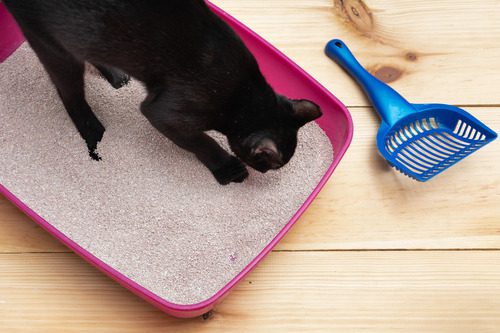If you’ve noticed your cat eating litter, it’s understandable to feel concerned and confused. It’s not a behavior most people expect from their cat, and seeing them do it even once can raise a lot of questions. You may be asking yourself, “Why is my cat eating litter? Is something wrong? Should I call the vet?” The short answer is that this behavior can signal several possible issues—some physical, some behavioral—and it’s always worth investigating further.
At Mills Animal Hospital in Acworth, GA, we often hear this question from cat parents who want to make sure they’re doing what’s best for their pets. If your cat has started eating litter, please call us at (770) 903-5995. We can help you determine what could be behind this unusual behavior and guide you toward the next best step.

What It Means When You Ask, “Why Is My Cat Eating Litter?”
When a cat eats litter, it’s rarely a random or harmless quirk. While some kittens may explore their litter box by tasting the litter once or twice, especially if they’re newly weaned, adult cats typically don’t engage in this behavior without a reason. If you’ve found yourself asking, “Why is my cat eating litter?” multiple times, it’s time to look deeper. This behavior, also known as pica, can stem from several underlying causes. It might indicate a nutritional imbalance, a medical condition, or stress-related behavior. Let’s take a closer look at the common reasons why cats might eat litter and what they could mean for your cat’s health.
Nutritional Deficiencies: A Common Cause
One of the most frequent answers to the question, “Why is my cat eating litter?” is nutritional deficiency. Cats sometimes eat non-food items when they’re missing key nutrients in their diet.
Lacking Essential Vitamins or Minerals
Cats may eat litter if their body is craving something it isn’t getting from their food. Iron deficiency, which may point to anemia, is one possible explanation. Other deficiencies, such as low levels of calcium or vitamin A, can also trigger unusual eating behaviors. If your cat is eating litter regularly, a blood panel may help determine whether their nutrient levels are where they should be. Please call us at (770) 903-5995 to schedule an exam and bloodwork at Mills Animal Hospital. We can assess whether your cat’s diet is meeting their nutritional needs or if changes are necessary.
Medical Conditions That May Be Involved
In some cases, asking “Why is my cat eating litter?” can lead to the discovery of a more serious medical condition. Cats use instinctual behaviors to manage how they feel, and this sometimes includes eating non-edible materials.
Anemia in Cats
Anemia reduces the number of red blood cells in your cat’s body, which can cause them to seek out unusual items like litter. If your cat is eating litter and also appears more tired than usual, is breathing rapidly, or has pale gums, anemia could be a factor.
Kidney Disease or Chronic Illness
Older cats are more likely to develop chronic illnesses like kidney disease, which can lead to nausea or altered appetite. Some cats may turn to litter because they’re feeling unwell, or because their sense of smell or taste has changed. If your cat has started eating litter and is showing other signs like vomiting, weight loss, or changes in behavior, contact Mills Animal Hospital right away at (770) 903-5995.
Behavioral Reasons Cats Eat Litter
Sometimes, the answer to “Why is my cat eating litter?” is behavioral rather than physical. Cats are highly sensitive animals, and changes in their environment or routine can lead to unusual behaviors.
Stress and Anxiety
Cats respond to stress in many ways, including hiding, vocalizing more, or altering their eating habits. In some cases, eating litter can be a self-soothing behavior. Changes such as a recent move, a new pet in the home, or even a change in litter brand might trigger this reaction.
Boredom or Lack of Stimulation
A cat that doesn’t have enough enrichment during the day may start to engage in strange behaviors to occupy themselves. If your cat has limited access to toys, climbing areas, or interaction, they might explore their litter box out of boredom—and start eating litter as a result.
Offering regular playtime, mental stimulation, and an enriching environment can help reduce stress-based behaviors. However, if this change in behavior happens suddenly or becomes repetitive, please contact our team at (770) 903-5995 to talk about the next steps.
What Type of Litter Is Your Cat Eating?
The type of litter your cat is consuming may offer clues about what’s going on. Pay attention to what kind of litter you’re using—clay, clumping, corn-based, or silica—and share that information with your veterinarian.
Clay and Clumping Litters
If your cat eats clay or clumping litter, this could pose a risk of gastrointestinal blockage. Clay is not digestible, and clumping agents may expand in your cat’s stomach. Even a small amount can become a concern, especially in kittens.
Natural or Plant-Based Litters
Corn, wheat, and paper-based litters may seem less dangerous, but eating any non-food substance is still not normal behavior. It’s important to monitor how much litter your cat is ingesting and how often this is happening. Make note of the litter type and amount your cat appears to be eating, and contact Mills Animal Hospital at (770) 903-5995 so we can help determine the next steps.
Is This Normal for Kittens?
When kittens first learn how to use the litter box, it’s not unusual for them to sample the litter with their mouth. This usually stops after a few tries, especially once they associate the litter box with elimination instead of play. If your kitten is consistently eating litter beyond the first few weeks of use, it’s time to take action. Kittens are more vulnerable to the effects of ingesting litter, and they may not be getting enough nutrients if their behavior continues. Please give us a call at (770) 903-5995 so we can examine your kitten and make sure they’re healthy and developing properly.
When Is It Necessary to Call Your Vet?
If you’ve asked yourself, “Why is my cat eating litter?” and you’ve seen this behavior more than once, don’t ignore it. While it may seem harmless at first, it can point to a range of concerns—from mild to more serious. You should contact Mills Animal Hospital if:
- Your cat has eaten litter more than once or twice
- Your cat is also acting lethargic, vomiting, or not eating
- You notice signs of anemia like pale gums or weakness
- Your cat is older and has other chronic symptoms
- Your kitten continues this behavior beyond a short exploratory phase
Even if you’re unsure whether it’s serious, it’s always better to speak with a veterinary professional. Our team in Acworth, GA, can help you figure out what’s going on and what the right approach might be.
Supporting Your Cat’s Health with Expert Guidance
As unsettling as this behavior can be, you’re not alone in asking, “Why is my cat eating litter?” Cats are complex creatures, and changes in behavior are often how they communicate discomfort. Whether it’s physical, emotional, or developmental, the best course of action is always to seek veterinary insight. At Mills Animal Hospital, we take every behavioral concern seriously and work with you to support your cat’s health and quality of life. If your cat has started eating litter and you’re not sure what to do next, please give us a call at (770) 903-5995. We’re here to help you navigate the issue and find peace of mind.
